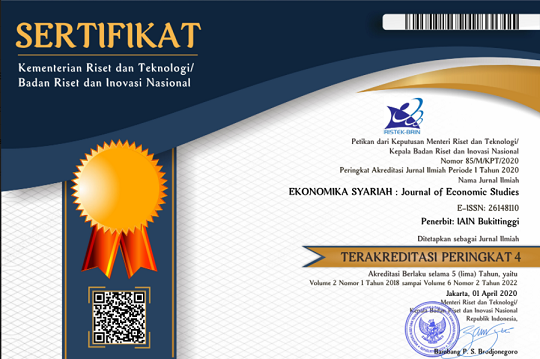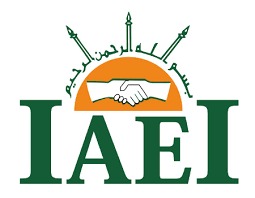The Impact of Using E-Wallets for the Ease of Muslim Consumers Transacting Maqashid Sharia Approach
DOI:
https://doi.org/10.30983/es.v7i1.6401Keywords:
e-wallet, Maqashid SyariahAbstract
This study aims to examine the impact of using e-wallets for the convenience of Muslim consumers transacting through the maqashid  sharia  approach. The type of research carried out is library research using a qualitative approach, and the data sources in this study consist of primary, secondary, and tertiary data sources. The data collection technique used in this study is a literature search. The data obtained will be analyzed qualitatively and descriptively. The results of the study found that transactions using the e-wallet feature are in line with the concept of maqashid  syariah  in Islamic law, meaning that essentially the use of this feature is in line with the purpose of Islamic law mandated at the level of Hajjyah, which is to provide ease of transaction for Muslim consumers where this form of transaction is inevitable because of its mass use in society. The use of this feature is important to be used in order to maintain property / malls which in the study of maqashid  syariah  is one of the dharuriyah al-khamsah that must be maintained.
Â
Penelitian ini ditujukan untuk meneliti dampak penggunaan e-wallet bagi kemudahan konsumen muslim bertransaksi melalui pendekatanb maqashid  syariah . Jenis penelitian yang dilaksanakan jenis penelitian kepustakaan (library research) dengan menggunakan pendekatan kualitatif di mana sumber data dalam penelitian ini terdiri dari sumber data primer, sekunder dan tersier. Teknik pengumpulan data yang digunakan dalam penelitian ini adalah dengan cara melakukan penelusuran pustaka. Data yang diperoleh akan dianalisis secara kualitatif dan diuraikan secara deskriptif. Hasil penelitian menemukan bahwa transaksi dengan menggunakan fitur e-wallet ini sejalan dengan konsep maqashid  syariah  dalam hukum Islam, artinya secara esensi penggunaan fitur ini sejalan dengan tujuan hukum Islam disyariatkan pada tataran hajiyah yaitu memberi kemudahan bertransaksi bagi konsumen muslim di mana bentuk transaksi ini memang tidak dapat dihindarkan lagi karena penggunaannya yang begitu massal dalam masyarakat. Adapun penggunaan fitur ini penting untuk digunakan dalam rangka memelihara harta/mal yang dalam kajian maqashid  syariah  termasuk salah satu dari dharuriyah al-khamsah yang mesti dipelihara
References
A. Mulyana dan H. Wijaya. (2018). Perancangan E-payment System pada E-wallet Menggunakan Kode QR Berbasis Android,. Komputika: Jurnal Sistem Komputer, 7(2), 63.
Al-Syatibi, A. I. (2003). al-Muwafaqat fi Ushul al-Syari’ah. Vol. II (Beirut: Dar Al Kutub Al Ilmiyah, Tt), 1, 290.
Al-Yubi, M. (1998). Maqashidu al-Syariah al-Islamiyah wa ‘Alaqatuha bi al-Adillati al-Syariyyah. Daar Al-Hijrah.
Al-Zuhaily, W. (1986). Ushul al-Fiqh al-Islami. Dar al-Fikr.
Aris Rusdiyanto. (2017). Tinjauan Prinsip Syariah Terhadap Produk E-Money Bank Syariah Mandiri. UIN Syarif Hidayatullah.
Busyro. (2017). Maqashid al-Syariah. WADE.
Elsa Silaen dan Bulan Prabawani. (2020). Pengaruh Persepsi Kemudahan Menggunakan E-Wallet dan Persepsi Manfaat Serta Promosi Terhadap Minat Beli Ulang Saldo E-Wallet OVO.
Harfandi, H., Zulhelmi, Z., & Sonita, E. (2022). The Effect of Entrepreneurship Attitude and Knowledge on Entrepreneurial Intention of Students. EKONOMIKA SYARIAH: Journal of Economic Studies, 6(1), 60–75.
Ika Yunia Fauziah. (2014). Prinsip Dasar Ekonomi Islam Perspektif Maqashid al-Syariah. Prenada Media Group.
Imam Gunawan. (2013). Metode Penelitian Kualitatif: Teori dan Praktik. Bumi Aksara.
Imam Syatibi. (n.d.). Al-Muwafaqat fi Ushul al-Syariah. Dar al-Kutub al-’Ilmiyyah.
Kamaludin, I. (2022). Keabsahan Uang Lektronik (E-money) Perspektif Qawaid Fiqhiyah: Sebuah Tinjauan Empiris Terhadap Kritik Uang Elektronik. Muslim Heritage: Journal Dialog Islam Dengan Realitas, 7(1).
Kuncoro, M. (2003). Metode riset untuk bisnis & ekonomi.
Meividaryani, E. (2020). Analisis Akad Syariah Terkait Praktik Go-Pay Pada Aplikasi Go-Jek.
Mestika Zed. (2008). Metode Penelitian Kepustakaan. Yayasan Obor Indonesia.
Moh. Toriquddin. (2014). Teori Maqashid Perspektif al-Syatibi. De Jure: Jurnal Syariah Dan Hukum, 6(1).
Moleong, L. J. (2013). Metodologi Penelitian Kualitatif. Remaja Rosda Karya.
Muamar, A., & Alparisi, A. S. (2017). Electronic money (e-money) in maqashid al-sharia perspective. Journal of Islamic Economics Lariba, 75–84.
Muhammad Al-Raisuni. (1992). Nadariyat al-Maqashid ‘Inda al-Imam al-Syatibi. Mu’assasah Al-Jami’ah.
Muhammad Ihsan Habibie. (2019). Tinjauan Sistem Transaksi OVO Berdasarkan Hukum Islam (Studi Kasus Pada OVO Booth di Malang Town Square). UIN Maulana Malik Ibrahim.
Nadhilah, P., Jatikusumo, R. I., & Permana, E. (2021). Efektifitas Penggunaan E-Wallet Dikalangan Mahasiswa Dalam Proses Menentukan Keputusan Pembelian. JEMMA (Journal of Economic, Management and Accounting), 4(2), 128–138.
Ni’mah, R., & Yuliana, I. (2020). E-Wallet: Sistem Pembayaran Dengan Prinsip Hifzul Maal. Jurnal Ekonomi Syariah, 5(2), 52–66.
Noor, K. A. M., & Yusoff, A. F. J. (2022). Status Patuh Syariah E-Money Akaun Jenama E-Wallet Popular Di Malaysia. Journal of Contemporary Islamic Law, 7(2), 11–18.
Puteri, H. E., Arinda, N., Mulyana, C. A., Puspita, D. O., & Husna, V. A. (2022). Examining the Determinants of Using e-Money Prepaid Software for Millennial Generation. European Journal of Business and Management Research, 7(2), 183–191.
Putri Nadhilah, Ridwan Indra Jatikusumo, E. P. (2021). Efektivitas Penggunaan E-Wallet di Kalangan Mahasiswa Dalam Proses Menentukan Keputusan Pembelian. JEMMA (Journal of Economic, Management and Accounting), 42.
Saputri, A. D., & Pratama, A. R. (2021). Identifying user characteristics of the top three e-wallet services in indonesia. IOP Conference Series: Materials Science and Engineering, 1077(1), 12028.
Sari, A. C., & Adinugraha, H. H. (2022). Implementation of QRIS-Based Payments Towards the Digitalization of Indonesian MSMEs. EKONOMIKA SYARIAH: Journal of Economic Studies, 5(2), 124–139.
Sari, R. (n.d.). Apa itu OVO? Ini Cara Daftar, Top Up, dan Cek Saldo Terlengkap.
Sugiyono. (2018). Metode Penelitian Kuantitatif,Kualitatif dan R&D. In ke-26.
Syamsu, N., Sofyan, S., Aisya, S., & MD, M. (2022). Integration of Using Fintech and Social Media for The Business Sustainability in Pesantren. EKONOMIKA SYARIAH: Journal of Economic Studies, 6(2), 167.
Ulin Nuha. (2020). Perlukan E-wallet Berbasis Syariah. MALIA: Journal of Islamic Banking and Finance, 4(1), 59–60.
Widianita, R., Ilhamiwati, M., & Hidayat, F. (2023). Analisis Permintaan Uang Perspektif Islam di Indonesia. AT-TAWASSUTH: Jurnal Ekonomi Islam, 8(1), 1–18.
Downloads
Published
How to Cite
Issue
Section
Citation Check
License
Copyright (c) 2023 Fakhry Emil Habib, Nofiardi Nofiardi

This work is licensed under a Creative Commons Attribution-ShareAlike 4.0 International License.
Authors who publish with this journal agree to the following terms:
- Authors retain copyright and grant the journal right of first publication with the work simultaneously licensed under a Creative Commons Attribution-ShareAlike 4.0 International License that allows others to share the work with an acknowledgment of the work's authorship and initial publication in this journal.
- Authors are able to enter into separate, additional contractual arrangements for the non-exclusive distribution of the journal's published version of the work (e.g., post it to an institutional repository or publish it in a book), with an acknowledgment of its initial publication in this journal.
- Authors are permitted and encouraged to post their work online (e.g., in institutional repositories or on their website) prior to and during the submission process, as it can lead to productive exchanges, as well as earlier and greater citation of published work (See The Effect of Open Access).




